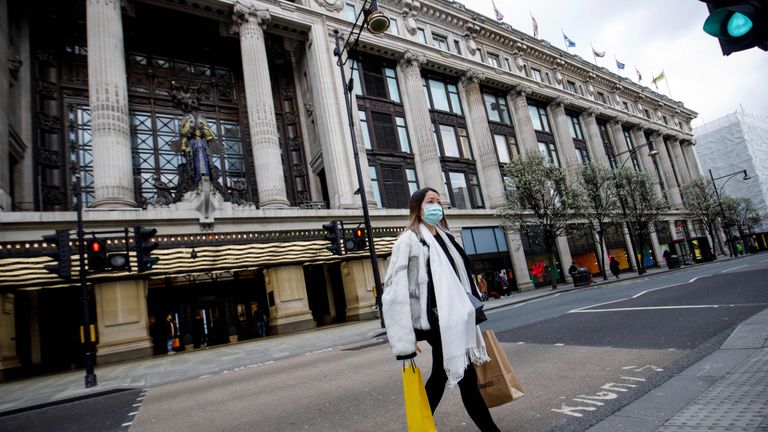Coronavirus: FTSE 100 lifts from near-decade low as central banks bolster stimulus
The ECB's latest measures mean the central bank will be pumping more than т�1trn into its financial system this year.
Thursday 19 March 2020 20:11, UK
Global stock markets have entered positive territory after further coronavirus stimulus action by the Bank of England and European Central Bank (ECB).
Values were firmly in the red on Thursday afternoon before the Bank of England announced its second interest rate cut of the month, taking Bank rate to a joint-record low of 0.1%, and a re-start of its asset purchase programme.
The ECB, the euro area's central bank, had hours earlier said it would be making €750bn (£708bn) in new bond purchases to boost liquidity in the financial system.
The US Federal Reserve also moved to shore up market confidence, by opening swap lines with central banks in nine countries to meet demand for the so-called reserve currency.
The FTSE 100 had been trading at its lowest level since the summer of 2010 - below the 5,000 point barrier - ahead of the Bank of England's announcement.
It closed 1.4% higher at 5,151 but the pound, which hits its weakest level in 35 years on Wednesday, failed to lift significantly as it hovered just above $1.16 despite the Bank's intervention.
The DAX in Germany and CAC in Paris were both up strongly at the end of the volatile session while, in New York, the Dow Jones Industrial Average fluctuated wildly after opening 3% lower. The US index ended the day just shy of 1% higher.
Investors have delivered a rout in values over the past month as the scale of disruption from COVID-19 has grown globally, with countries descending into lockdown, stoking fears of economic collapse.
Central banks and governments have been taking measures aimed at easing the burden but they have had a minimal effect on investor sentiment until today.
The ECB's latest announcement, taken alongside previous action, means it will be pumping more than €1trn of new funds into its financial system to support economic activity.
Germany's economy minister Peter Altmaier told Deutschlandfunk radio: "I hope these measures will also make it clear to the stock markets, to the markets today that Europe will protect its interests and Europe is determined to overcome this crisis."
Sky's business presenter Ian King agreed, saying: "You name it, they really are chucking the kitchen sink at it."
Markets had been lifted on Tuesday by the promise of stimulus measures, with the Dow climbing more than 5% after US President Donald Trump unveiled plans for an $850bn stimulus package, including help for airlines and cheques of up to $1,000 for every American citizen.
But on Wednesday, the Dow bled more than 2,000 points - almost 10% - at one stage.
:: Listen to the Daily podcast on , , , .
Market analysts said the falls in New York reflected some frustration that the Trump stimulus was yet to materialise.
It has to be agreed by Congress and US treasury secretary Steven Mnuchin told the Fox Business Network on Thursday that it was hoped the legislation could be passed early next week.
Growing numbers of factories across Europe and the US are closing down - following the lead set by China at the beginning of the year as it coped with the early spread of coronavirus.
A decision to close UK schools from Friday evening, except for the children of key public workers and those deemed vulnerable, will put greater pressure on the economy as parents are forced away from their work.
The global economy is, according to many economists, almost certain to be in recession given the scale of the disruption.







